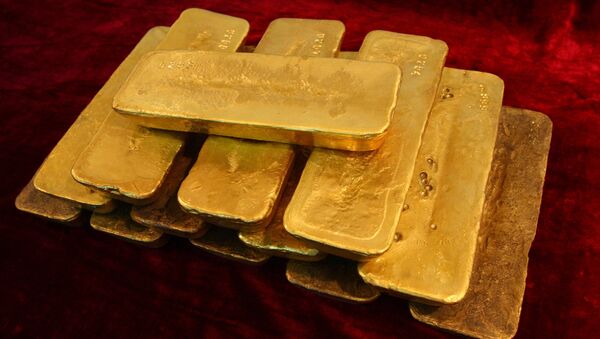Sputnik: Tell me about this move to repatriate Hungarian gold. I understand that Germany is also interested in this. What is this trend all about and why are we seeing this? What are the pros and cons?
Dimitri Speck: I was a little bit involved in the gold repatriation issue in Germany, and in Germany the topic is slightly different than in Hungary, in the Hungarian situation, because Hungary has only three tons of gold which is about 120-130 million dollars. So the value is not so [high]. The main reasons which the central bank of Hungary stated, is that they want to show a signal of strength. And, of course, they want to reduce the risk; this is also a key point, because gold is the only asset in the central bank reserves that does not have a counterparty risk. And, of course, you reduce the risk to zero if you have the gold at home and not abroad.
Sputnik: Do you think that this will actually make Budapest more independent?
Dimitri Speck: The amount of gold for Hungary with three tons is too small to say that it adds to the independence. It's more a sign and maybe it has some reasons of regarding this particular amount. But for the whole country the importance is quite small, of this amount.
Sputnik: We have very interestingly in recent years Russia, China and Turkey that have been buying gold for their national reserves and also they've been calling for the use of gold in foreign trade operations, you know, sort of to move away from US dollar and US dollar dominance. Do you see this as a trend that could spread?
Dimitri Speck: Generally speaking, yes. The US is losing its share, the share of the world economy of the US is getting smaller and smaller, and for other countries like China or Russia the dependence on the US dollar has also disadvantages, for instance, especially like it is now, as the tensions are rising. You have more independence if you pay not in the currency of the country with which you are in tensions.
READ MORE: Hungary Repatriating Tons of Gold From UK Amid Fears of Economic Crisis
This is a clear tendency and, in my opinion, it will also continue because the US is very much indebted. It's not only political issue, but it's also an issue of the economic value of your reserves. And an indebted country sooner or later has the tendency to inflate the currency, especially the foreign creditors. In this case mainly China, but also for instance the Arab countries, are losing value through devaluating the US dollar. So, generally speaking, for other countries it's never a good idea to invest a huge part of your reserves in only one currency. And I think this trend will continue to go away from the US dollar, not only for Russia and China, but sooner or later also for other countries.
Sputnik: Just a final question…do you think that this is going to have some kind of a long term effect on the US economy, on the price of the US dollar and generally speaking on the US economy, I guess?
Dimitri Speck: In international business and in the central bank reserves, this is a key point that the dollar loses share, and gold increases in importance. It will, of course, have a huge importance for the US and, in my opinion, a positive influence, because currently the US has, for decades, a huge deficit, and this huge deficit is partly paid through foreign central banks who lend the US money. And this is just an easy way for the US to indebt itself and to consume more than they produce. For the US, there would be a stop of this financing of this deficit.
READ MORE: Fear of Future or Plans to Give Up Euro? Reasons Behind German Gold Repatriation
Of course, it would be more difficult for the consumer, for both in the private and public sector, to get goods. But on the other side, it would lead to a kind of reindustrialization of the US because of the currency rates which are also influenced by this flow of money. And in my opinion, what Donald Trump, the US President, wants to approach through trading taxes and tariffs, he would better do by reducing the indebtedness and by reducing the amount of US dollar which is stored in other central banks. This would help the US to reduce the trade deficit much more than what he is currently doing. But, of course, for politicians it's much more difficult to go this way, than the easy way through more indebtedness and to make a kind of trade war. Generally, I think it's a good tendency if the US dollar loses importance in the central bank reserves internationally.
The views and opinions expressed Dimitri Speck are those of the speaker do not necessarily reflect those of Sputnik.



